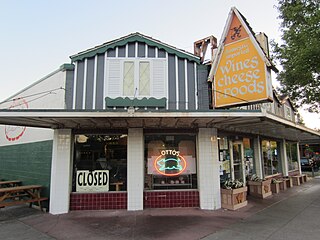Related Research Articles

In the United States, pigs in a blanket are small hot dogs or other sausages individually wrapped in pastry, commonly served as an appetizer.

A hot dog is a dish consisting of a grilled, steamed, or boiled sausage served in the slit of a partially sliced bun. The term hot dog can refer to the sausage itself. The sausage used is a wiener or a frankfurter. The names of these sausages commonly refer to their assembled dish. Hot dog preparation and condiments vary worldwide. Common condiments include mustard, ketchup, relish, onions in tomato sauce, and cheese sauce. Other toppings include sauerkraut, diced onions, jalapeños, chili, grated cheese, coleslaw, bacon and olives. Hot dog variants include the corn dog and pigs in a blanket. The hot dog's cultural traditions include the Nathan's Hot Dog Eating Contest and the Oscar Mayer Wienermobile.

A corn dog is a hot dog on a stick that has been coated in a thick layer of cornmeal batter and deep fried. It originated in the United States and is commonly found in American cuisine.

A chili dog is a hot dog served in a bun and topped with a meat sauce, typically chili con carne. Additional toppings may include cheese, onions, and mustard. The style has multiple regional variations in the United States, many calling for specific and unique sauce ingredients, types of hot dogs, or types of buns and referred to regionally under region-specific names.

The Dodger Dog is a hot dog named after the Major League Baseball franchise that sells them, the Los Angeles Dodgers. It is a 10-inch pork wiener wrapped in a steamed bun. The hot dog is sold at Dodger Stadium located in Los Angeles, California. According to the National Hot Dog and Sausage Council, the projected number of 2011 season hot dogs sold at Dodger Stadium was 2 million—establishing Dodger Dogs as the leader in hot dog sales of all those sold in Major League Baseball ballparks.

The Koegel Meat Company is a meat processing, packaging, and distribution company based in Flint, Michigan. Koegel's produces 35 products. Koegel's hot dogs are considered by the authors of "Coney Detroit" as the best hot dog for a Flint-Style Coney Dog along with Abbott's Meat's coney sauce. Koegel is also a supplier of A&W, about 200 Coney restaurants, Walmart, Dairy Queen and Kroger. Distribution of its own products to each store gives Koegel an advantage of being able to give a shorter shelf life, at half its competitors, to ensure a fresh product.

Vienna sausage is a thin parboiled sausage traditionally made of pork and beef in a casing of sheep's intestine, then given a low-temperature smoking. The word Wiener is German for 'Viennese'. In Austria, the term Wiener is uncommon for this food item, which instead is usually called Frankfurter Würstl.

A Michigan hot dog, Michigan red hot, or simply "Michigan" is a steamed all-beef hot dog on a steamed bun topped with a meaty sauce, generally referred to as "michigan sauce", and is a specialty in and around Plattsburgh, New York.

A Coney Island hot dog, Coney dog, or Coney is a hot dog in a bun topped with a savory meat sauce and sometimes other toppings. It is similar to a chili dog, and is often offered as part of a menu of classic American diner dishes and often at Coney Island restaurants. It is largely a phenomenon related to immigration from Greece and the region of Macedonia to the United States in the early 20th century.

The white hot is a variation on the hot dog found primarily in the Rochester, New York area, as well as other parts of Western New York and Central New York. It is composed of a combination of uncured and unsmoked pork, beef, and veal; the lack of smoking or curing allows the meat to retain a naturally white color. White hots usually contain mustard and other spices, and often include a dairy component such as nonfat dry milk.

A hot dog stand is a business that sells hot dogs, usually from an external counter. Hot dog stands can be located on a public thoroughfare, near a sports stadium, in a shopping mall, or at a fair. They are often found on the streets of major American cities. According to one report, some hot dog stands are paying up to $80,000 in rent for prime locations in Manhattan.

Different areas of the world have local variations on the hot dog, in the type of meat used, the condiments added, and its means of preparation.

A half-smoke is a type of hot dog found in Washington, D.C., and the surrounding region. Larger, spicier, and with more coarsely-ground meat than a regular hot dog, the sausage is often half-pork and half-beef, smoked, and served with herbs, onion, and chili sauce.

A cheese dog is a hot dog served with cheese or processed cheese on it or stuffed within it, as a filling.

Olive loaf is a type of meatloaf or cold cut embedded with pimento-stuffed green olives similar to the Italian sausage meat mortadella. The deli meat—typically a mixture of beef and pork, though chicken has been used by meat producers such as Oscar Mayer — is often made by mixing green olives into milk powder before mixing it into the meat with spices such as mace, coriander and pepper. Green olives are typically the olives used in the loaf, as black olives would tend to bleed into the meat. In some cases, the meat mixture thickened with additives like milk powder and soy flour to prevent the olives from sinking. It is often sold in loaf-shaped sets.

A vegetarian hot dog is a hot dog produced completely from non-meat products. Unlike traditional home-made meat sausages, the casing is not made of intestine, but of cellulose or other plant-based ingredients. The filling is usually based on some sort of soy protein, wheat gluten, or pea protein. Some may contain egg whites, which would make them unsuitable for a lacto-vegetarian or vegan diet.

A hot dog cart is a specialized mobile food stand for preparing and selling street food, specifically hot dogs, to passersby. In some jurisdictions, a cart operator must meet stringent health regulations designed to protect the public. Hot dog carts are quick and easy food services, supplying millions of people with food every day. In 2015 the U.S. Hot Dog Council estimated that 15% of the approximately 10 billion hot dogs consumed by Americans in 2014 were purchased from a mobile hot dog vendor cart. Hot dog carts are very common in New York City, and most of the hot dogs purveyed by hot dog carts in New York City are sourced from Sabrett.

Otto's Sausage Kitchen, formerly Otto's Meat Market, is a sausage restaurant and meat market located in the Woodstock neighborhood of Portland, Oregon, United States. German immigrant Otto Eichentopf established Otto's Meat Market in Aberdeen, Washington in the 1910s before relocating to Portland in 1921. Otto's Meat Market opened on Southeast Woodstock Boulevard in 1922. A new building was constructed at its current location in 1936–1937. Eichentopf's son Edwin acquired the store in the 1940s; Edwin's son Jerry, who began working at Otto's full-time starting at age eighteen, acquired the stores in 1983. Since then, he and his wife have expanded the retail part of the store. The family, which now includes the couple's children and extended members, makes more than forty sausage varieties on site, including some based on Eichentopf's recipes from Germany.

Jeff's Gourmet Sausage Factory is a glatt kosher sausage factory and restaurant in Los Angeles, California. Established in 1999 in a small storefront in the Pico-Robertson district, it serves a variety of Eastern European Jewish– and Mediterranean-style sausages, hamburgers, and deli sandwiches and wraps. All of its meats are prepared in-house.
References
- 1 2 "Celebrate summer with Connecticut-made hot dogs". Hartford Advocate. 2010-07-06. Retrieved 2010-07-26.
- ↑ "Grote & Weigel Meats Going Out Of Business After 122 Years". Hartford Courant. 27 January 2012. Retrieved 27 January 2012.
- ↑ "Doogie's Two-Foot Hot Dog Is No More". Hartford Courant. Retrieved 27 January 2012.
- ↑ "An Auctioneer's Mailing Saves Grote & Weigel". Hartford Courant. Retrieved 16 June 2012.
- ↑ "Let us know you're not a robot".
- ↑ "Products". Archived from the original on 2019-02-01. Retrieved 2019-01-31.
- ↑ "Archived copy". Archived from the original on 2019-02-01. Retrieved 2019-01-31.
{{cite web}}: CS1 maint: archived copy as title (link)